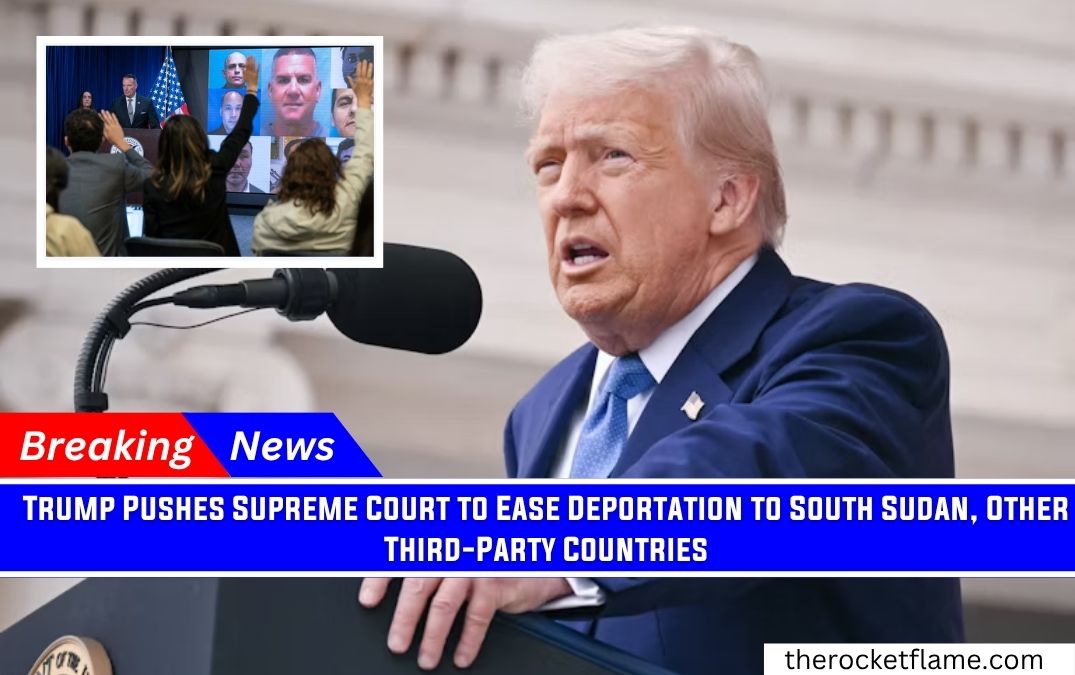President Donald Trump has urged the Supreme Court to relax restrictions on deporting migrants to countries other than their homeland, including South Sudan.
This move continues his administration’s contentious immigration policies aimed at speeding up removals despite legal challenges.
What Happened
The Trump administration requested the Supreme Court to overturn a lower court ruling that blocked deportations of migrants to third countries without proper notice or opportunity to contest their removal.
The case centers on a policy allowing the Department of Homeland Security to send migrants to nations like South Sudan — not their home countries — even if they face risks there.
Key Details
- The policy was enacted soon after Trump returned to office.
- It permits deportation to third countries without prior notice or chance to claim persecution or torture.
- US District Judge Brian Murphy, appointed by President Biden, halted deportations to such countries unless migrants receive written notice and can claim credible fear.
- Murphy ruled the Trump administration “unquestionably” violated his injunction by attempting deportations to South Sudan without giving detainees meaningful chances to object.
- His May 21 order requires at least 72 hours’ notice before interviews where migrants can express fear of removal to third countries and allows 15 days to reopen cases if needed.
- The Trump administration argues these requirements exceed the law and that diplomatic assurances prevent mistreatment in third countries.
- The 1st US Circuit Court of Appeals recently refused to pause Murphy’s ruling, highlighting risks of “irreparable harm” from wrongful deportations.
- Concerns also grew over potential deportations to Libya, where detainee abuse is widely reported; Libya denies any deportation agreement with the US.
Reactions or Statements
The Department of Justice claimed the US faces a “crisis of illegal immigration” and removing the “hardest to remove” individuals is vital for national security.
Judge Murphy criticized the administration’s actions as rushed and unfair, noting detainees lacked access to lawyers and family during attempted transfers.
Immigrant advocacy groups condemned the policy as dangerous, emphasizing risks of torture or death in unstable third countries.
Investigation or What’s Next
The Supreme Court will soon decide whether to ease deportation rules and allow the Trump administration to proceed with third-country removals without strict notice and fear-claim procedures.
Meanwhile, lower courts maintain restrictions to protect migrants from being forcibly sent to countries where their safety is not guaranteed.
FAQs
Q1: What is the Trump administration’s third-country deportation policy?
It allows deporting migrants to countries other than their homeland or a country where they have legal status, without prior notice or opportunity to claim fear of persecution.
Q2: Why is the policy controversial?
Critics argue it endangers migrants by sending them to unstable countries where they risk torture, persecution, or death without proper legal safeguards.
Q3: What did the court rule about deportations to South Sudan?
US District Judge Murphy blocked deportations without 72 hours’ notice and a chance for migrants to claim credible fear, calling the administration’s actions “unquestionable” violations.
Q4: Has the Supreme Court decided on this case?
Not yet. The Trump administration has appealed, asking for emergency relief to bypass lower court orders.
Q5: Are there concerns about deportations to Libya or Saudi Arabia?
Yes. Deportations to Libya are particularly criticized due to documented human rights abuses, and courts have barred removals to those countries under current orders.
Summary / Final Takeaway
President Trump’s bid to ease deportations to third-party countries like South Sudan highlights ongoing tensions in US immigration enforcement.
Courts continue to enforce protections ensuring migrants receive notice and a chance to contest removals to countries where they may face grave risks.
The Supreme Court’s upcoming decision will significantly impact future immigration policies and migrant rights.












